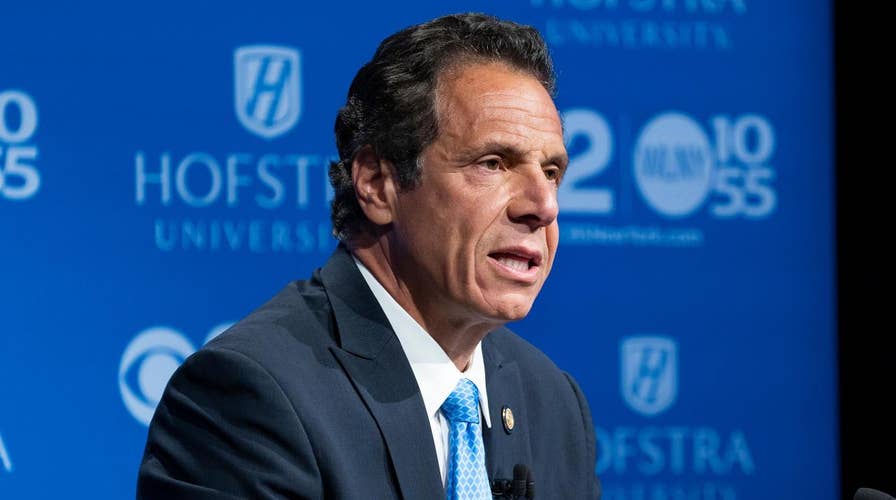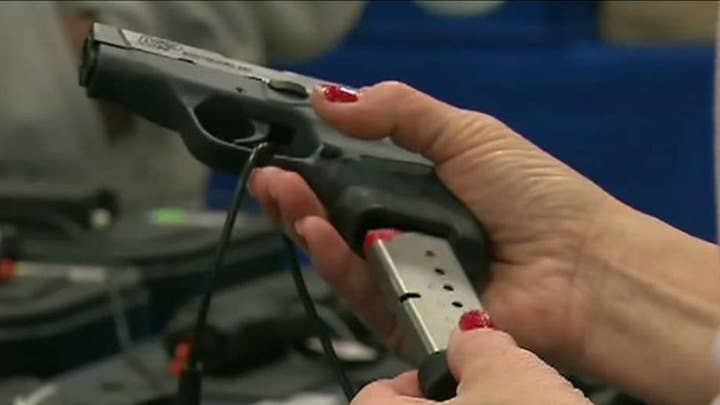Is Andrew Cuomo out of touch with the Democratic Party?
Washington Examiner chief correspondent Byron York discusses the debate between New York Governor Andrew Cuomo and actress Cynthia Nixon. Byron also weighed in on the Florida governor’s race.
A campaign by New York Democratic Gov. Andrew Cuomo to crack down on the National Rifle Association and similar groups is facing its first big legal test, with a federal judge expected to decide soon whether to allow a challenge to go forward.
Cuomo’s administration has asked Judge Thomas McAvoy of the U.S. Northern District of New York to throw out a First Amendment lawsuit by the NRA that claims the policy restricting financial activity with pro-gun organizations amounts to viewpoint discrimination.
The judge heard arguments on the motion to dismiss on Sept. 10. The decision, whatever it may be, will have far-reaching ramifications for free-speech and gun rights, the limits of financial regulation and possibly even the 2020 presidential contest.
The case has prompted an unusual alliance. The liberal American Civil Liberties Union, despite its support for gun control, filed a friend of the court brief in defense of the free-speech rights of the NRA.
Earlier this month, Cuomo defeated actress Cynthia Nixon in the Democratic gubernatorial primary, and he will likely coast to re-election to a third term in November. Though he said he won’t run for president, he’s widely seen as a potential contender for the 2020 Democratic nomination, and going after one of the left’s most reviled organizations could only help in that pursuit.
The case is more important than anyone’s political aspirations, said William Brewer, the lawyer for the NRA in the case.
“This is giving the power to a state to discriminate against entities based on viewpoint,” Brewer told Fox News.
“If the script was flipped, and a conservative governor of Kansas was very pro-life, his administration could target Planned Parenthood’s financial activity,” Brewer added. “Or, if it’s another governor, the administration could target the finances of Friends of the Earth or the Sierra Club.”
In April, Cuomo directed the state’s Department of Financial Services to encourage insurance companies, banks and other financial services companies licensed in New York state to review whether business interactions with the NRA and “other similar organizations” would pose “reputational risk.”
“New York may have the strongest gun laws in the country, but we must push further to ensure that gun safety is a top priority for every individual, company, and organization that does business across the state,” Cuomo said at the time.
New York Financial Services Superintendent Maria T. Vullo said the agency “urges all insurance companies and banks doing business in New York to join the companies that have already discontinued their arrangements with the NRA.”
In May, the department hit Lockton Affinity with a $7 million fine and Chub Ltd. with a $1.3 million fine for their involvement with the NRA’s “Carry Guard” insurance for gun owners that use a firearm in self-defense but face civil or criminal liability expenses. Both companies dropped the NRA. The Second Amendment group now contends it has trouble getting corporate insurance because companies fear state investigation, while banks have declined to provide financial services for the organization.
Cuomo also urged fellow governors in an August letter to ban Carry Guard because the NRA’s insurance policy is “providing illegal insurance coverage to gun owners for intentional criminal conduct.”
In the motion to dismiss, New York Attorney General Barbara Underwood argued, “Both the guidance letters and the press releases are classic government speech—they are expressing the government's position in the public gun control debate, which is entirely permissible.”
However, Cuomo may have undermined Underwood’s argument when he gleefully tweeted in August, “If the @NRA goes bankrupt because of the State of New York, they'll be in my thoughts and prayers. I'll see you in court.”
New York has definitely used state power going well beyond expressing an opinion, Brewer argues.
“The state took actions well beyond the guidance letters,” Brewer told Fox News. “The dots connect themselves. The governor sent out a press advisory that Superintendent Vullo is monitoring not just the NRA but other pro-Second Amendment groups. Shortly after, within days, the department issued fines.”
The New York Department of Financial Services referred Fox News to the April announcement on the policy and, when asked if someone could speak on the policy, a spokesperson said “unfortunately no, not at this time.”
Neither Cuomo’s office nor Underwood’s office responded to inquiries for this report.
The program is similar in spirit to the Obama administration’s Operation Choke Point, which tried to discourage banks from offering financial services to “high risk” customers – which included short-term lenders and firearms dealers. The Trump Justice Department later ended the program.
The liberal ACLU and the conservative Texas Public Policy Foundation each filed a friend of the court brief in the New York case siding with the NRA’s ability to move for discovery.
The ACLU brief in August said New York “indisputably targeted the NRA and similar groups based on their ‘gun promotion’ advocacy.”
“It is important to note that, however controversial it may be, ‘gun promotion’ is core political speech, entitled to the same constitutional protection as speech advocating for reproductive rights, marijuana legalization, or financial deregulation,” the ACLU brief continued. “The central questions, then, are whether the guidance letters threatened adverse action against banks and insurers that associate with the NRA or other ‘gun promotion’ advocacy groups, and whether this threat was motivated by the government’s hostility to a ‘gun promotion’ viewpoint.”
Fred Lucas is the White House correspondent for the Daily Signal. Follow him @FredLucasWH.












































